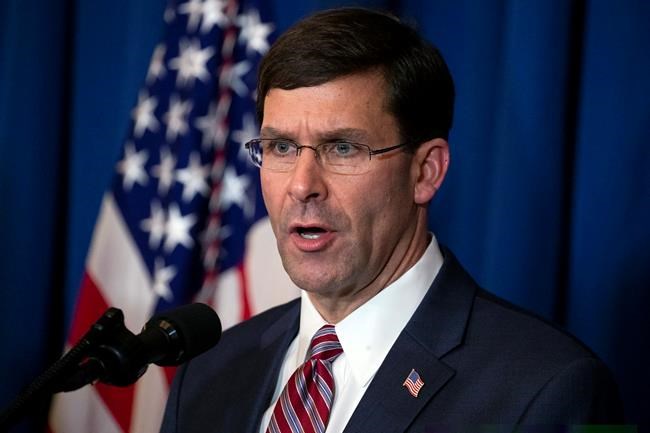‘Honest mistake’ sets off alarm about US troops in Iraq
Advertisement
Read this article for free:
or
Already have an account? Log in here »
To continue reading, please subscribe:
Monthly Digital Subscription
$1 per week for 24 weeks*
- Enjoy unlimited reading on winnipegfreepress.com
- Read the E-Edition, our digital replica newspaper
- Access News Break, our award-winning app
- Play interactive puzzles
*Billed as $4 plus GST every four weeks. Offer only available to new and qualified returning subscribers. Cancel any time.
Read unlimited articles for free today:
or
Already have an account? Log in here »
Hey there, time traveller!
This article was published 06/01/2020 (1852 days ago), so information in it may no longer be current.
WASHINGTON – For a few tense hours Monday, the United States appeared to have announced that American troops were pulling out of Baghdad after nearly 17 years.
Turns out, it was just an “honest mistake.”
“Here’s the bottom line, this was a mistake,” Gen. Mark Milley, chairman of the Joint Chiefs of Staff, said as he tried to unravel a knot of miscommunication that came at a time of already soaring tensions with the Middle East.

The bungled message started when a draft letter from Marine Brig. Gen. William Seely began circulating on social media. Addressed to an official at the Iraqi Ministry of Defence, the letter said U.S. troops would be “repositioning forces” to prepare for “onward movement.”
Seely added, “We respect your sovereign decision to order our departure.”
The “order” Seely mentioned was a reference to the Iraqi parliament’s vote over the weekend to expel U.S. troops after an American drone attack killed a top Iranian general in Baghdad.
A flurry of news reports followed Seely’s letter, saying the United States was ending its military presence in Iraq.
But after a few hours of denials and frantic phone calls, top Pentagon leaders tried to do damage control, stating flatly that the U.S. had no plans to leave and saying the letter was a poorly worded draft that never should have gone out.
“Nobody’s leaving,” Milley said. “There’s no onward movement. Honest mistake.”
Defence Secretary Mark Esper said the U.S. has been re-positioning troops, largely due to increased security threats from Iran. The letter was meant to co-ordinate with the Iraqi military on an increase in U.S. helicopter and troop movements as they shift positions around the country, Esper and Milley said.
“There’s been no decision whatsover to leave Iraq,” Esper said. “There’s no decision to leave, nor did we issue any plans to leave or prepare to leave.”

It’s not entirely clear who leaked the letter. According to Milley, the draft was circulated to key Iraqi officials as part of a co-ordination process to let them know about the increased helicopter movements. Officials say it was first posted on the website of an Iranian-backed militia group.
“Now it’s a kerfuffle,” Milley lamented.
Efforts Monday to reach Seely and his spokesperson were not successful.
The blunder is a black eye for the Pentagon at a time of high tensions stemming from the targeted killing of Iranian Gen. Qassem Soleimani, the head of Iran’s elite Quds Force.


